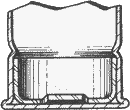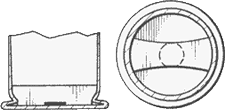- 01: Introduction
- 02: History
- 03: Propellants, Firearms, and Ammunition Development
- 04: Modern Firearms Manufacture
- 05: Small Arms Ammunition
- 06: Evidence Handling Procedures
- 07: Equipment and Instrumentation
- 08: Examination of Firearms
- 09: Cartridge and Shotshell Examination
- 10: Characterization and Evaluation of Fired Projectiles
- 11: Bullet Comparison and Identification
- 12: Gunshot Residue and Distance Determination
- 13: Toolmark Identification
- 14: Communicating Results
- Resources


Centerfire
Home > Propellants, Firearms, and Ammunition Development > Ammunition > Cartridge Cases > Centerfire
Development focused on placing the pellet of fulminate so that it was better retained. Most design work placed the pellet in the center of the cartridge base. This cartridge class was known at the time as centrallyprimed or centralfire; today known as centerfire. Once again, the interdependence of gun and ammunition design and development came into play; firing pins of rimfire firearms had to be moved to strike the center of the case rather than the rim.

Benet primed cartridge
There is a broad range of early centerfire priming systems, many originating in military arsenals. Those classified as internally primed looked like rimfire cartridges when viewed from the base. These have a separate metal structure carrying the priming pellet, which is pushed from the inside to the case’s base and crimped in place prior to charging with propellant. There is no evidence of the primer in the physical appearance of the cartridge. Two such designs used by U.S. arsenals in the post-Civil War period were the Benet system and the Martin bar anvil system. Benet-primed ammunition was standard issue for U.S. military rifles and revolvers through the late 1870’s.

BAR ANVIL-PRIMED cartridge
Despite the initial success of the internally primed cartridge, development continued. Central priming still required a thin and flexible case to allow the firing pin blow to effectively transmit energy to the internally mounted fulminate pellet. The solution required a stronger cartridge case, while retaining thin metal over the priming pellet. This was accomplished by separating the case from the primer.




